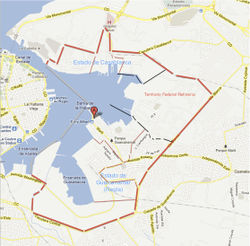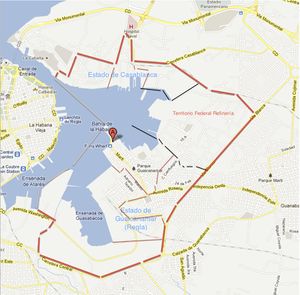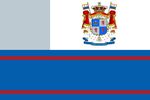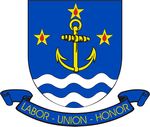Ultramarine Reglan Republic
This article refers to a nation which is currently in a state of inactivity. You can help make the article reflect that or ask on the talk page for further information. |
Ultramarine Republic of Regla | |
|---|---|
| Motto: Unión, Honor, Labor (Spanish: 'Union, Honor, Work) | |
| Anthem: Sobre la Lanchita | |
 Regla, Cuba | |
| Capital and largest city | Guaicanamar |
| Official languages | Cuban Spanish; Reglan |
| Demonym(s) | Reglano, Reglana |
| Government | Electronic Democracy |
• Plimeł Consejelo | Ðairõ Jił |
• Plimeł Minihtro | Tadsio Auguhto |
| Legislature | Federal Parliament |
| Establishment | 2010 |
| Population | |
• (as of 2011 census) census | 10 |
| Currency | Virtual Yemayá |
| Time zone | Cuba Standard Time (UTC -5) |
Website [1] | |
This nation is a member of the VMSB | |
The Ultramarin Republic of Regla (Reglan: Jepúḅrica Uttłamałina d'Jegła) is a micronation founded on August 13, 2010. It's an Ucronic Micronation and a Hyperdemocratic Government.
Etymology
The name Regla comes from the name of the Cuban municipality of Regla, that was named after the Chapel of the Virgen of Regla, a virgin that allegedly came from Africa with St. Augustin. In Afro-Cuban Religions, she is identified with orisha Yemayá. Ultramarine (Beyond the Sea) makes reference to its position across Havana Bay.
Ucronic history
The origin of the Republic was an uprise of the Municipal Assembly of Regla. After a few clashes and the negative of Cuban soldiers to fight, Cuba and Regla signed 5 treaties named La Ciruela Treaties System, recognizing Reglan independence, and stipulating war payments and Cuba-Reglan relationships.
After that, elections were held and a Federal Assembly concentrated the constituent, legislative and executives powers. It introduced a lot of new laws, liberalizing economy, recognizing political, social and economical rights, redacted a new Federal Constitution and finally organized elections based on electronic democracy. This period of 5 years is known as Años del Caos (Chaos' Year). After the beginning of "Relajo con Orden" ("mess with order") system, country has developed a peculiar democratic government with a all-citizens legislative assembly, Federal Councils...
A few "wars" have taken place with Cuba, more or less diplomatic disagreements: War of the 5th Ciruela Treaty, Wi-Fi War, The Casablancan Deputies impeachment, etc. A dissident group, Autarky of Ermenegildo, dominated the western land after the recognition by the Guaicanamar Court of its right, but after denouncement of human right violations, Guaicanamar Militia recovered the place.
Government and politics
Regla is ruled by a system self-named Electronic Democracy, or Mess with Order.
For this, it is divided in two Federal States: Guaicanamar (or Regla) and Casablanca. There is also a Federal Territory: Refinería, coinciding with the area of the oil refinery. States are divided in Civil Councils (Guaicanamar State: Regla, Loma, Modelo, Bahía; Casablanca State: Ferrocarril, Puerto, Centro)
The country has a Constitution passed on September 15, IInd Republican Year, with 128 amendments.
The vote is universal, secret and electronic, for citizens over 15 years olds
The Executive Branch:
Head of State: First Counselor (Plimel Consejelo) of the Federal Council, Second and Third Counselors elected by the States.
Head of Government: Prime Minister (Plimel Minihtlo)
Cabinet: Minister proposed by First Counselor and approved by referenda of States Councils and Legislative Branch
Elections: First Counselor elected by Legislative for three years, Prime Minister elected by legislative from a short list presented by the Federal Council.
Legislative Branch:
All the citizens older than 15 years. It works through the Electronic Democracy, wholly informatized, remote. Sporadicly, it has been elected a Legislative President, as moderator, but it is uncommon. All legislative elections follows Borda System, a system based on consensus, not majoritarian.
Political Parties:
Ad hoc Party System, founded for a specific target and then dissolved. Between the most lasting Parties have been the Casablancan Normalization Party, the Reglan Expansion Party, Party for the Review of La Ciruela Treaties. A historically important Party was the Electronic Democrat Party, that achieved the implementation of the current system. In Casablanca, Parties might nominate candidates for State and Federal Councils.
Political Pressure Groups: A lot of them, generally support candidates for Federal, State and Civil Council. Differently to Parties, they are easily formed."
Law and order
Law Branch:
Judges of the Federal Supreme Court and Constitutional Supreme Court are elected by a mixed system where members of the Reglan Lawyer Union have 3 votes and rest of citizens one, from a list elaborated by the Council. Cumulative Vote System.
Police is a competence of the Civil Councils. Nowadays, most of police members are Cubans, enrolled at the beginning of the Chaos' Years.
Foreign relations
None. Regla not recognize any nation government and has no diplomatic relationships with any State. In Micronational world, there have been efforts to integrate the Ligue of Secessionist States (LOSS), and it is now applying to the League of Countries. It is already member of OAMicro Forum.
Military
By the La Ciruela Treaties, no Army is allowed in the Republic. A Voluntary, Self-Organized Militia exists. In the few cases where Cuban-Reglan clashes needed the use of force, the Police of Guaicanamar State was called (Specifically to occupy the Wi-Fi buffer zone at the beginning of the Wi-Fi War).
Geography and climate

Localization: Two Peninsulas between the Reglan Hills and Havana Bay. 23° 7′ 30″ N, 82° 19′ 55″ O
Area: total: 9 km2, comparison with rest of the world: 242° place; earth: 9 km2, water: a few square meter of rivers and territorial Bay waters in co-dominium with Cuba.
Comparative Area: slightly bigger than Gibraltar
Borders: more or less 7 km, with Cuba.
Coastline: 7 km
Maritime claims: territorial sea 0 (zero) nautical miles (nm), adjacent zone: 2 nm, Exclusive Economic Zone: 0 nm. Regla has access to Havana Bay and cuban territorial waters straightly north to Regla.
Climate: Urban, moderate, with minima in January and maxima in August. Rainy period from September to November. Dry from May to August.
Land: Mounty, with valleys downing from hills to sea and a savanna at South of Bay.
Higher Point: Lenin Hill, 200 m
Natural Resources: land, serpentine rock
Economy
Combines a great control by laws, treaty systems and quality normative, with a great easiness for star up new national enterprises. Government only administers the Oil Refinery in the Federal Territory Refinería, as a Ltd Cia with all reglans as stakeholders. Annual revenues are payed to an official count of each citizen, tax-free.
In the Chaos' Years, a part of Cuban War Payments were invested as credits to open national companies, It is estimated that 50% of Reglans are owners of a small or medium sized company. Due to the conservative deputies pressure in Caos' Years, big companies have more credits and tax facilities if managed as co-operatives or have a mixed ruling between owners and employees. Due to the licensing system, most of big companies are formed per-demand and later executed or transformed. A classic example was the Metro Cia. combining private initiative, public funding, co-operative formation and transformation from constructer to operator.
Data as GIP are difficult to calculate due to economical dynamism and the use of a virtual currency. Nevertheless, thanks to the informatized transactions system, it is known that circa 100 millions of yemayás (virtual currency) are moved annually in sell-buy actions (aprx 30 M euros), the average income per citizen is 110 000 yemayás (c 30 000 euros), population under poverty line is 1%, Gini index is about 0.4.
Language
Official languages are Cuban Spanish, mostly spoke at Casablanca, and Reglan, an language developed from Cuban Spanish but with different alphabet, verbal paradigm and vocabulary. The most complete information on this language could be found at Official Website of the Reglan Ultramarine Republic (link at the bottom of this page; in Spanish)
Culture
Culture has roots in pre-independet period. Regla disputes with Guanabacoa and Salvador de Bahía the world capitality of syncretic african-rooted religions. Casablanca is a prominent catholic region. Protestant have certain influence: baptist and pentecostals in Guaicanamar, baptist and adventist in Casablanca. Jehova Witness are important in Union Quarter. There are near of 23 abakuas "games" ( backing to 1836) and 4 Masonry Loggias.
Other cultural characteristics: Sea transport, sport fishing, baseball and softball popularity, chess and crazyhouse...
In the last times, Regla has started with the virtual football, adhering to the Virtual Micronational Soccer Board. A Hattrick team based on São Paulo, Brazil, is named Ultramarina F.C and is being sponsored by the Republic.
Media
Media is ruled by each Civil Council. There are a lot of newspaper, some TV and radio broadcasting. Internet is not only popular but essential to the Reglan Democracy. 100% of the Reglan territory is covered by a free wifi.
See also
Años del Caos; Relajo Con Orden

